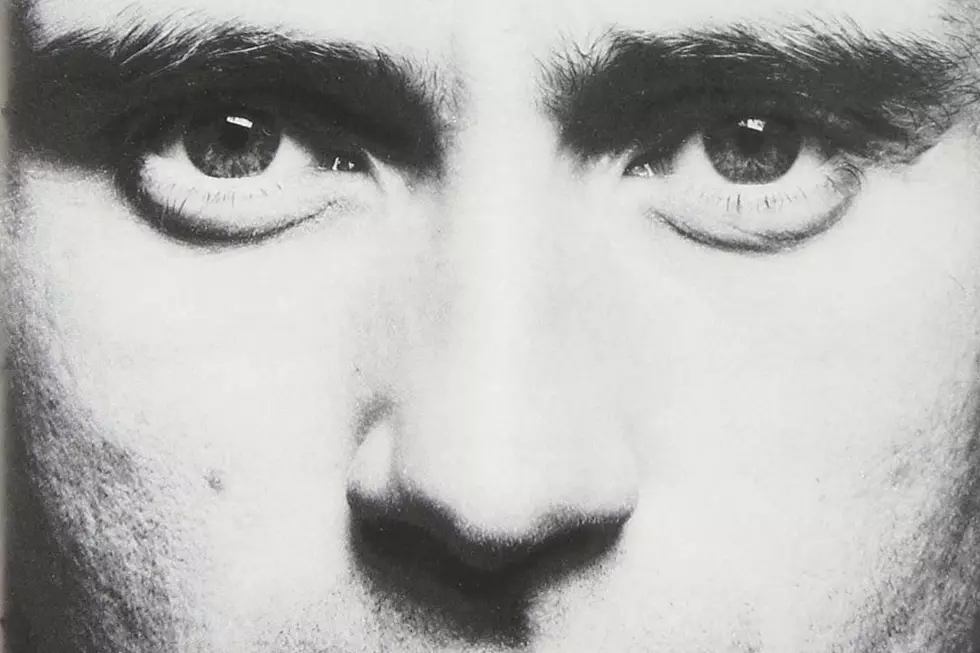
How a Breakup Inspired Phil Collins’ First Solo LP, ‘Face Value’
Things should have been looking up for Phil Collins in early 1981.
His band was finally getting some mainstream recognition after drifting somewhere a little above cult territory for years. He'd just turned 30. And his first solo album, Face Value, was all ready for release. But the Genesis singer and drummer's personal life was in turmoil, as a five-year marriage which had yielded one son began to fall apart.
After spending the past few years writing and singing songs about mythical forest creatures and other prog-approved subjects, Collins used his solo debut to vent his hurt, frustration and confusion about the impending breakup. From the harrowing opener "In the Air Tonight" to the album's penultimate track, the fragile ballad "If Leaving Me Is Easy," it's the most personal record he's ever made. Face Value closes with a cover of the Beatles' Revolver mind-trip "Tomorrow Never Knows," and that actually fits thematically if you squint the right way.
Ironically, it was Genesis' success following the release of 1978's ... And Then There Were Three ... , and the massive world tour that accompanied it, that was partly to blame for Collins' divorce. But he was determined to work it out, and took a break from the band to try to patch together what was left of his marriage.
By winter 1979, however, Collins' wife was gone – leaving him alone in the house with his feelings. He soon got to work penning the songs that would end up on Face Value in February 1981: "In the Air Tonight," "I Missed Again" and "You Know What I Mean," among them. He even wrote a song about a new woman in his life ("This Must Be Love") that let a little light into the darkness. ("Against All Odds [Take a Look at Me Now]," which became a No. 1 hit in 1984, was also written for the album but left off because he didn't want to weigh down the LP with too many ballads.)
Watch Phil Collins Perform 'Missed Again'
But even if the general tone was one of hurt and heartbreak, Collins was shrewd enough to disguise some of them in cheery pop hooks (like "I Missed Again," the album's first single, which just cracked the Top 20) and weave some unrelated breakup-free songs into the mix (like a cover of Genesis' "Behind the Lines," which first appeared in proggier form on the band's Duke album the year before). Employing Earth Wind and Fire's Phenix Horns, and swerving into radio-friendly R&B territory, for some songs, Collins made sure Face Value wasn't all about tears.
That's what stands out, though. The haunting "In the Air Tonight" sounds like it's narrated by a ghost, or at least a shell of a man, for its first three minutes or so. When the famous cascade of tumbling drums breaks the relative calm, it's as much about a futile attempt at bottling that simmering frustration as it is release. There's no mistaking that something is ripping up Collins inside. Same goes for the ballads -- far more than had appeared on any single Genesis album up to that point. There's genuine hurt and ache in his words and voice.
Genesis fans followed Collins on his inaugural solo outing. Face Value climbed to No. 7, higher than any of his band's albums at the time. (Abacab, which was released later in 1981, also made it to No. 7.) Within a few years, Collins' solo success would outpace the group's: He'd score seven No. 1 singles and two No. 1 albums, while Genesis' highest-charting LP, 1986's Invisible Touch, made it to No. 3. (The record's title track was also their only No. 1 single.)
And it all started with a personal and purgative work that stemmed from one of Collins' lowest periods in the '70s. That he was able to make his definitive solo statement and go on to lead Genesis to bigger things over the next decade says much about his drive and productivity. Both would expand before the '80s were over.
Phil Collins and Peter Gabriel Albums Ranked
See Phil Collins in Rock’s Craziest Conspiracy Theories
More From Ultimate Classic Rock









